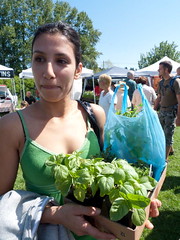Summer's here...
Long days and warm nights. Good for growing food and enjoying the beauty of BC's rural landscapes.
Before you settle into the garden (or the garden chair), we hope you'll be inspired by some of the conversations about land use, conservation, and sustainability we've gathered in this posting of CITinfoResource.
The June 2010 Issue
Since our last editorial dispatch in mid-May we've posted a number of items that reflect some of what the Real Estate Foundation of BC does in non-metro BC communities. In her overview of the Organic Farming Institute of BC administrator Sarah Clark outlines how Foundation investments are translating into smarter, more sustainable agricultural practices in BC's Okanagan and Similkameen Valleys – and beyond. As this is being written, Tim Pringle is attending the Interface 2010 conference in Smithers. In our interview, Tim talks about what the conference is about and why it's important to non-metro communities.
Tim is also the co-author of George Penfold's latest post on creating more effective rural economic development in BC's regions. George also responds to Maureen LeBourdais' post on the BC Rural Summit, and comments on his joint post with Tim in this audio post.
A lot of what happens on the community side of the Foundation's investments have to do with sustainability. BC has a number of experts on sustainability – and a number of people who are still puzzling over what that means "on the ground." We recently interviewed Mark Holland and received a great – critical – response from Vancouver Island resident Charnal Macfie. In his most recent appearance at CITinfoResource Mark continues the dialogue. Gene Miller is another of the experts on sustainability we've had the pleasure to work with here at CITinfoResource. Gene's particular expertise is related to organizing one of the premiere sustainability conversations in Canada: the Gaining Ground Summit series, which the Real Estate Foundation of BC has helped to sponsor on a number of occasions. Our video interview with Gene looks at the 2009 Resilient Cities event, and forward to the upcoming October 2010 event in Vancouver. Finally, I weigh in with some thoughts on what Tim Pringle has described as the "rural/urban divide."
Coming soon...
CITinfoResource will host a number of posts over the summer, following up on themes we've presented during the year. We've got an interview with Kathy Bishop of Leadership BC's Central Vancouver Island chapter, talking about the June "Dialogue in Nanaimo" about water sustainability. We'll be posting about the environmental planning initiative coordinated by the South Okanagan-Similkameen Conservation Program. We're also going to be talking to Tim Pringle about the outcomes of the Smithers Interface 2010 conference. As you recline lakeside or gardenside during these summer months, take a moment to see what else is being posted about activities related to investments by the Real Estate Foundation of BC in non-metro BC communities!
Investment in community sustainability
The Real Estate Foundation of BC funds a wide range of land use related projects in non-metro BC communities. In 22+ years the Foundation has been involved in over 1500 projects across BC, with more than half of these outside the Lower Mainland and Victoria. CITinfoResource is one way that the Foundation is extending the reach of these projects, recirculating it through CITinfoResource via our blog, Facebook, and Twitter posts. You can also connect with the Foundation at its website and its new Facebook page.
Our goal at CITinfoResource is to "stimulate and support the conversation about land use, conversation, and sustainability amongst land-use practitioners in non-metro BC communities." Check us out. Use and circulate our resources and posts. Let us know if we're having an impact in your region or organization.
hanspetermeyer
Editor,
CITinfoResource
– 30 –
©Real Estate Foundation of BC / 2010. We encourage the reproduction of articles on this website for non-profit educational purposes. Please notify the Foundation and the author of all reproductions, including in-house uses.








![Reblog this post [with Zemanta]](http://img.zemanta.com/reblog_e.png?x-id=af5bfa1f-8b5a-4ea9-8c78-3d9005851a87)

![Reblog this post [with Zemanta]](http://img.zemanta.com/reblog_e.png?x-id=d788d0c7-fef8-47e6-b9ff-f2bb873b1b10)